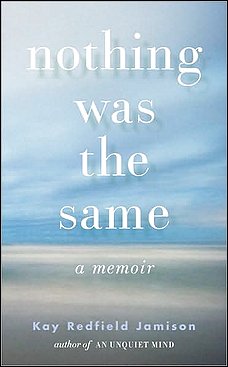Culture Vulture: Nothing Was the Same
Though the writing in Nothing Was the Same is often beautiful and moving, the memoir failed to fully engage me.
 Nothing Was the Same by Kay Redfield Jamison, Knopf, 208 pp., $25
Nothing Was the Same by Kay Redfield Jamison, Knopf, 208 pp., $25
In 1995, a psychology professor named Kay Redfield Jamison took the unusual step of publishing an article in her local paper, the “Washington Post,” about her battle with manic depression; later that year, her extraordinary and extraordinarily-well-written memoir An Unquiet Mind, became a best-seller.
Before 1995, Jamison was known primarily as a researcher, the co-author with Frederick K. Goodwin, MD of the textbook Manic-Depressive Illness, published in 1990 and author of a second text on creativity and manic depression titled Touched with Fire. Unlike most authors of memoir, Jamison was putting her professional life at risk by publishing her book. As a clinical psychologist and professor of psychology, her decision to go public as a woman suffering from “manic-depression” (she has said that the term “bipolar” minimizes and distorts the illness) was antithetical to many of her colleagues. How could she continue to work as a clinician if patients knew she took lithium? How could she effectively teach students if they knew about the tumult of her mental life?
Jamison returns to this cost-benefit analysis in her new book Nothing Was the Same, but this time through the prism of her marriage to Richard Wyatt, the scientist and specialist in schizophrenia with whom she lived for nearly 20 years.
“It is in our nature to want to hold on to love,” she writes simply. Like Lynn Caine (Widow) Joan Didion (The Year of Magical Thinking), Anne Roiphe (Epilogue), and Madeleine L’Engle (Two-Part Invention), who have written memoirs of their marriages after a beloved spouse has died, Redfield is only partially successful in transforming a ritual of mourning into literary art. While Jamison often writes with the lyricism and precision of a poet, Nothing Was the Same is nowhere near as affecting nor as revelatory as An Unquiet Mind, a classic of memoir that I have bought for dozens of friends and recommended to many students. That book is a meditation that succeeded in conveying both the rawness of lived experience and the wisdom of long reflection.
Though the writing in Nothing Was the Same is often beautiful and moving, it failed to fully engage me. Memorializing one’s marriage is a dicey assignment. How many times can one write, as Jamison does, “We had fun” or “I want him back,” before the reader puts the book down.
Jamison is such an intelligent and honest writer, and one whose voice I enjoy so much that I read until the end. There are many wonderfully dry passages such as this one describing herself, before An Unquiet Mind, as an unlikely memoirist who “like most people, had been brought up to be private about personal matters….Being an Episcopalian didn’t help. The Frozen Chosen had thawed over the years but still veered toward immoderate discretion…I did not confess, concede or admit. It wasn’t done.”
While Jamson was able to transcend her reticence about personal matters in her memoir of mental illness, she does not in Nothing Was the Same. In a foreword that promises far more than she is able to deliver, Jamison writes: “He was my husband, colleague, and friend: when he became ill and we knew he would die, he became my mentor in how to die with the grace by which he had lived. What he could not teach me — no one could — was how to contend with the grief of losing him.” We never get a real picture of what Dr. Wyatt was like as a man, a doctor or a husband, nor how she and he first got together and developed as a couple. Although the memoir is billed as a meditation on mortality, grief and loss, I finished it wondering what I had learned. Perhaps this memoir was written too soon and needed another couple of years to steep.
I look forward to reading Jamison’s next book.
—————————————————————————–
Helen Epstein is the author of the memoirs Children of the Holocaust and Where She Came From. Order through the link below to Amazon and theartsfuse receives a (small) percentage of the sale.
